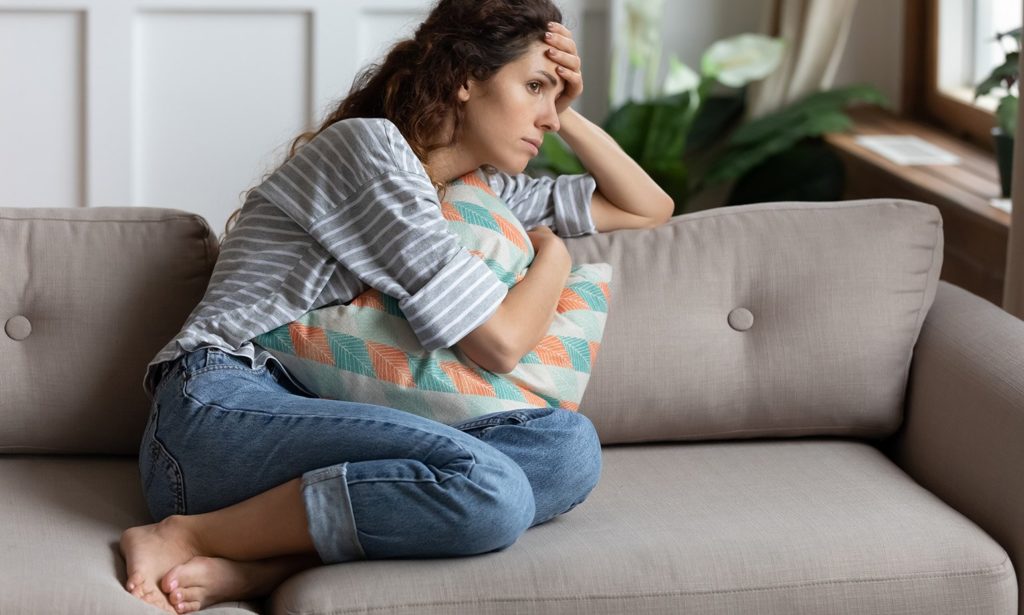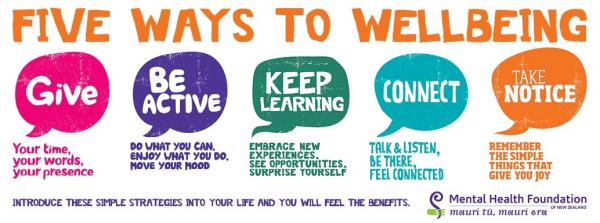
You may be experiencing anxiety, anger, fear, contentment or any other emotion as we navigate through this Covid-19 storm (and lockdown in New Zealand and parts of Australia). These are all normal reactions to an abnormal situation. And despite us all travelling through the same Covid storm, we’re on different vessels…some are on luxury liners and easing through the storm quite happily (baking and gardening!), whilst others are holding on to their basic wooden raft with all their might. No matter your vessel, having empathy and understanding for others’s journeys can go a long way.
.
But what can we do to support our mental wellbeing in times of uncertainty and challenge? Here are some simple tips to support your Mental Wellbeing…
.
5 Ways to Wellbeing
We provide Mental Wellbeing training and workshops to businesses, as well as individuals, to help keep people mentally well. We’re only too happy to share some of this knowledge with you here, as it is proven to help protect and support mental wellbeing regardless of how you are currently feeling. We use a variety of health strategies to create behaviour change, but one health model we use a lot is the 5 Ways to Wellbeing – with five key, yet simple actions you can embed in your life to support your mental wellbeing. It’s been endorsed by the Mental Health Foundation of New Zealand and various other health agencies around the world, and is based on scientific studies as to what keeps us well and functioning.
.
Here are the 5 Ways to Wellbeing, five simple actions to embed in your routine to help keep you well.
.
We use Wellness Plan templates to record which actions work well for different people, but you can just jot some ideas down on a piece of paper or your phone to increase awareness. Under each heading, think about what activities you enjoy doing or would like to try…how this may look in lockdown could be different to normal life so we’ve got a few ideas to get you started.
.
Give (tukua)
We don’t always think of “Giving” as helping our wellbeing but our stress hormone levels actually reduce when we do something for others which is positive for our health. We do need to tread carefully with this way to wellbeing though, some people are naturally givers and can give so much they become depleted…so giving also includes giving to yourself. Think of the oxygen mask analogy when you’re flying and attend to your own before helping others. Giving in lockdown could be:
- Making your partner or bubble members a hot drink
- Ring a relative or neighbour to check in that they’re doing ok
- Spending some time playing with your kids
- Putting on a facemark and putting your own feet up
- Donate online to a charity that is special to you
.
Be Active (me kori tonu)
Physical activity is just as important for our mental health as it is for physical health. A recent study at the University of Vermont showed that 20 minutes of exercise provided 12 hours of mood benefits! Boom. What could you do to embed activity into your day, even during lockdown:
- Walk in the sunshine with your bubble, or on your own if you need some space
- An online workout, we enjoy Move It Mama – a range of exercise classes that can be regressed pr progressed, and only take 20 minutes ($10/month) or online Yoga/Pilates
- Playing with the kids – kicking a ball around, jumping on the trampoline
- Dance party at home
- Gardening
- Vigourous housework (pop some dance music on and go for it!)
.
Keep Learning (me aka tonu)
Mastering skills, embracing new experiences and trying new things can create new neural pathways in our brain, as well as reward-based neurotransmitters that help us feel great. This all leads to supporting brain health which can help reduce cognitive decline in the future and keep us happy and healthy now! Lockdown opportunities for learning could include:
- Trialing a new recipe or food
- Listening to a podcast or webinar on a topic you’re interested in
- Download a new book on Kindle
- Try a different lockdown walk route, or try a new exercise class
- Plan a weekend away to somewhere different once we drop alert levels
.
Connect (me whakawhanaunga)
This one is a biggie…as humans we’re wired for connection and when we’re socially isolated, we tend to have more issues with depression. Connecting can also be more tricky when we’re in lockdown but the following could be ways you can prioritise this:
- Make Zoom dates for drinks or chats with old friends
- Carve some time out for time with your partner
- Call your parent/grandparents/kids/siblings/longlost cousin to check in and catch up
- Plan that girls weekend away once we’re out and about again
- Enjoy some spontaneous playtime with the kids
.
Take Notice (me are tonu)
This way to wellbeing is a lovely one…being in the moment. When we spend too much time ruminating on the past or worrying about the future we can feel stressed, anxious and worried. When we zone in on a pleasant experience, we tend to feel good. Or we can turn to mindfulness or meditation apps to lead us through activities to calm and centre us:
- Enjoy a drink (alcoholic or non-alcoholic) outside and listen to the birds, feel the sun/breeze on your face, really taste your drink and look up to the sky
- Take a bath, shower or spa and enjoy the sensation of the hot water on your skin, the sound of water running or swirling, the smell of the water/bath salts and the peace
- Enjoy doing an activity you love – art, scrapbooking, tinkering on a car, spending time in the garden
- Try a mindfulness or meditation app – Calm, Smiling Mind, Headspace are all popular, some are free and some are paid memberships so check before giving in credit card details!
.
Putting it all together
Whilst these all may seem small and insignificant actions, when we do them consistently and layer them up in our lives, they make a BIG difference. If you are feeling good mentally they can help keep you there; if you feel that your mental health is taking a slide they can help support you to feel better. But you don’t have to do it alone, if you are feeling that it is becoming overwhelming make sure you let people know:
- Your GP can help
- To talk with a trained counsellor, call or text 1737
- Call or text LIFELINE 0800 543 354 (0800 LIFELINE) or free text 4357 (HELP)
- Ring the Suicide Crisis Hotline 0508 828 865 (0508 TAUTOKO)
- Call the Rural Support Trust 0800 787 254
- Talk with a friend, relative or trusted community member
Plus, our lovely Sarah D is always happy to help, during alert levels 3 and 4 she can offer Zoom or phone call consults. Her philosophy on mental health is practical support using simple strategies and techniques that improve your mental health and functioning. Get in touch if you’d like to arrange a session with her.
.
And lastly…routine.
.
How having a routine helps protect your mental wellbeing
Having a routine in your day is really useful to help provide some structure, and also accomplishment at the end of the day. It helps our body’s adjust and know what to expect, even where there is much uncertainty in the world. Just like a child’s bedtime with brushing teeth, a warm bath, popping on PJs and reading a story prepares them for bed, daily habits and a routine as an adult can prepare us for the day in a positive way. Don’t be too hard on yourself though or cram in too many activities so you feel overwhelmed, but starting the day with a shower, fresh clothes, morning walk and a hot drink will be achievable and enjoyable.
.
We hope you enjoyed our simple tips to protect your mental wellbeing, sending you all lots of love and support x

